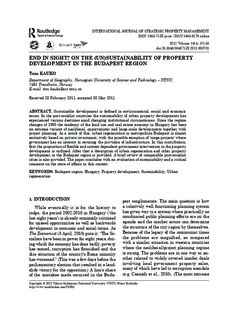End in sight? On the (un)sustainability of property development in the Budapest region
Journal article, Peer reviewed
Published version

Åpne
Permanent lenke
http://hdl.handle.net/11250/2621859Utgivelsesdato
2012Metadata
Vis full innførselSamlinger
- Institutt for geografi [1031]
- Publikasjoner fra CRIStin - NTNU [37703]
Originalversjon
International Journal of Strategic Property Management. 2012, 16 (1), 37-55. 10.3846/1648715X.2011.600781Sammendrag
Sustainable development is defined in environmental, social and economic terms. In the post-socialist countries the sustainability of urban property developments has experienced various destinies amid changing institutional circumstances. Since the regime changes of 1990 the tendency of the land use and real estate economy in Hungary has been an extreme variant of neoliberal, opportunistic and large-scale developments together with project planning. As a result of this, urban regeneration in metropolitan Budapest is almost exclusively based on private investment, with the possible exception of ‘mega-projects’ where government has an interest in securing the provision of infrastructure. In this contribution, first the proposition of flexible and context dependent government intervention in the property development is outlined. After that a description of urban regeneration and other property development in the Budapest region is provided. A brief review of comparable post-socialist cities is also provided. The paper concludes with an evaluation of sustainability and a critical comment on the state of affairs in this context. End in sight? On the (un)sustainability of property development in the Budapest region
